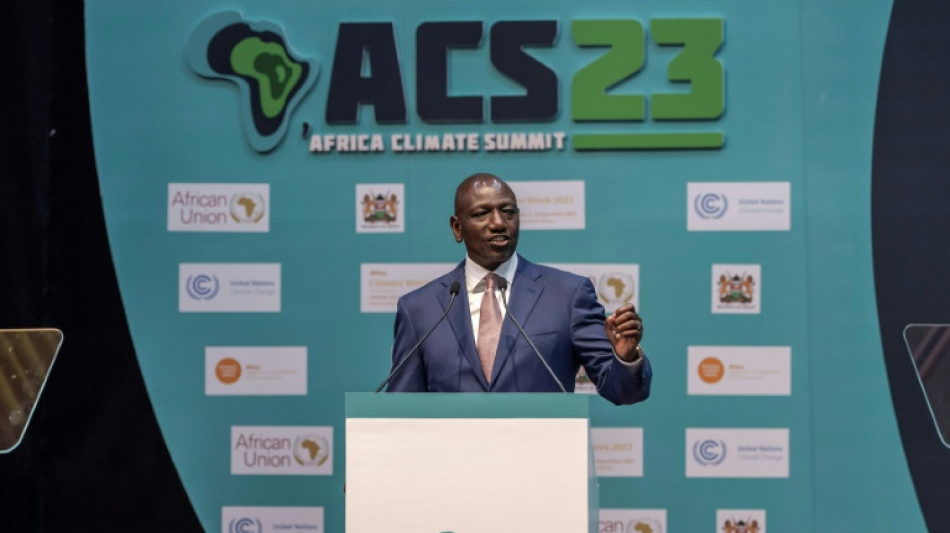
Calls for reform of global finance system dominate Africa climate talks

UN chief Antonio Guterres joined African leaders on Tuesday in demanding urgent reforms to the "outdated and unfair" global financial system, speaking at a landmark climate summit in Kenya aimed at showcasing the continent's green potential.
The Nairobi summit hopes to boost investment in renewables, with the UAE on Tuesday pledging $4.5 billion to accelerate Africa's clean energy transition as the continent's leaders look to reshape its economic narrative.
The three-day conference, which began Monday, has attracted heads of state, government and industry leaders from across Africa, as well as EU chief Ursula von der Leyen and US climate envoy John Kerry.
It is billed as an effort to define a shared African vision for green development on the diverse continent of 1.4 billion people ahead of the COP28 meeting in Dubai later this year.
Speakers at the Africa Climate Summit have doubled down on calls to reform global financial structures to align with climate goals, with leaders also urging more investment to support a push towards clean energy.
UN Secretary-General Guterres drew attention to Africa's unequal access to economic opportunities even as the continent bears the brunt of climate-related disasters despite contributing the least to global warming.
"Global governance structures reflect the world as it was, not as it is," Guterres said, calling the international financial system "outdated, unfair and dysfunctional".
"Renewable energy could be the African miracle but we must make it happen," he said.
Kenyan President William Ruto said the continent could not hope to access its potential to be a green powerhouse unless a "just regime" was established.
He said African nations paid five times the borrowing rates of advanced economies, burdening them with mounting debt.
"We want a fair financial system that treats everybody equally. That is not too much to ask," he said.
The V20, a group of more than 50 climate vulnerable countries, called for reforms that would channel capital towards cash-strapped nations struggling to attract investment.
"Our focus is prosperity, not mere survival. Expect the V20 to continue to shake the tree of complacency and demand immediate action," said V20 chair Ken Ofori-Atta, who is also Ghana's finance minister.
- 'Assume your responsibilities' -
Despite an abundance of natural resources, just three percent of energy investments worldwide are made in Africa.
On Tuesday, the United Arab Emirates promised $4.5 billion in clean energy investments in Africa -- the most significant pledge so far, with COP28 president and UAE oil executive Sultan Al Jaber saying the funding would "jumpstart a pipeline of bankable clean energy projects in this very important continent".
Jaber, who heads the UAE's national oil company ADNOC and government-owned renewable energy company Masdar, said a consortium including Masdar would help develop 15 gigawatts of clean power by 2030.
Africa's renewable generation capacity was 56 GW in 2022, according to the International Renewable Energy Agency.
Jaber also called for "a complete upgrade" of the global financial system.
With the world falling far short of global goals to limit warming, Guterres spoke directly to G20 nations, whose leaders are meeting in India at the weekend, and told them to "assume your responsibilities" in the battle to reduce planet-warming emissions.
- 'Universal threat' -
Geopolitical tensions have cast a shadow on hopes of finding common ground in the fight against global warming.
But US envoy Kerry struck a cautiously optimistic note on Tuesday, saying he hoped Washington and Beijing "could come together" to tackle "a universal threat".
"I do hope that China and the United States, the two largest economies in the world, the two largest emitters in the world, I hope we could come together" on the issue of climate change, Kerry told reporters.
A clean energy transition across the world's developing nations will be crucial in order to keep alive the Paris Agreement goal of capping global warming "well below" two degrees Celsius since pre-industrial times, and 1.5C if possible.
To make that happen, the International Energy Agency says investment will need to surge to $2 trillion a year within a decade -- an eight-fold increase.
A coalition of civil society groups has been urging Ruto to steer global climate priorities away from what it perceives as a Western-led agenda that champions carbon markets and other financial tools to redress the climate crisis.
T.F.Russell--TNT